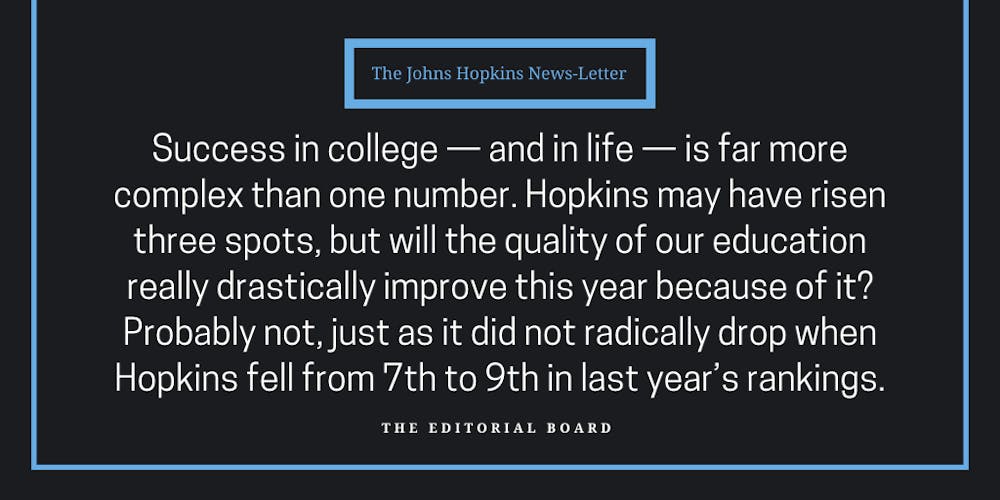Admittedly, Hopkins may not have much school spirit, but there is one time of the year where we all rally: the release of the U.S. News & World Report College Rankings. This year, Hopkins rose from ninth in last year’s rankings to sixth — its highest position yet. The top 10 schools have remained virtually static compared to last year, with the major changes being Brown University falling out of the top ten and the University of Pennsylvania dropping from sixth to 10th.
U.S. News claimed that over 35 million people consulted the rankings from 2022 to 2023. Yet, the rankings have been marred with controversy and criticism that has grown louder in the past few years.
In 2022, Columbia University — ranked second in the nation at the time — was criticized by a faculty member for submitting misleading and inaccurate data to U.S. News. The university eventually stated that it had inaccurately reported the percentage of classes with fewer than 20 students by a whopping 26 percentage points, then fell to 18th in the nation the following year.
Last year, U.S. News updated their methodology to rely more on data from third-party sources than from the Universities. Still, some of the metrics themselves raise questions. Peer assessment is weighted 20%, while Pell recipients' graduation rates are weighted at 5.5% and student-faculty ratios weigh 3%. Certainly there is an argument that other educators are competent evaluators of the quality of peer schools, but it should not be one fifth of the criteria. How Harvard feels about Johns Hopkins has no bearing on how students rate the outcome of their education and experience on campus.
In addition, the peer assessment scale only ranges from 1-5, with 1 being a ‘marginal’ academic quality and 5 being ‘outstanding’ academic quality. Selecting a number 1 through 5 is not sufficient enough to accurately capture a university's academic acumen, and the difference between a ‘4’ school and a ‘5’ school is surely nebulous. The response rate to these surveys is abysmal, with only 30.7 percent of national universities responding for the 2025 rankings, highlighting the failure of peer assessment to represent all, or even the majority, of one’s peers.
Ultimately, U.S. News’ methodology and metrics are unreliable markers of a university's academic status, making the organization a questionable source of authority on what are the ‘best’ universities.
Universities have begun to acknowledge that the rankings fall short of accurately measuring academic quality: Columbia stopped submitting statistics to the survey last year, citing that “rankings do not accurately capture the student experiences or the priorities of the institution.” Top medical and law schools have also pulled themselves out of the rankings, including our very own medical school.
In 2023, the Hopkins School of Medicine withdrew from U.S. News rankings, with Dr. Theodore L. DeWeese, the then-interim Dean of the School, citing that “rankings do not fully account for the many factors that distinguish one medical school from another.” Despite withdrawing, the institution’s prestige has not waned.
This sentiment speaks to the broader question: Why do we care about rankings at all?
Many may perceive the U.S. News rankings as an unbiased third-party evaluation, but this view lacks context. U.S. News profits from its rankings by selling the rights to display ranking badges to universities for promotional purposes. This financial relationship highlights the problematic nature of the rankings system — a system that benefits from the very attention it garners. In reality, the more we buy into rankings, the more we fuel their profitability, at the expense of gaining true insight into the quality of an institution.
University administrators and prospective students should prioritize what truly matters: the quality of academics, student experiences and institutional values. Universities should focus on enhancing the experiences and learning of students, rather than on boosting certain metrics that earn them a higher ranking. No one university can be boiled down to a handful of metrics, much less one definite number.
To prospective students, the message is clear: choosing a university should not be about chasing a superficial number that fluctuates year by year. What is more important is whether a school aligns with your academic interests and has an environment that fits your goals; all aspects that a single ranking won’t tell you.
None of this is to suggest that current students, ourselves included, should not take pride in attending a highly regarded institution. But success in college — and in life — is far more complex than one number. Hopkins may have risen three spots, but will the quality of our education drastically improve this year because of it? Probably not, just as it did not radically drop when Hopkins fell from 7th to 9th in last year’s rankings. Ultimately, our time at Hopkins is defined by how we make the most of the opportunities presented to us, the quality of relationships we build and the knowledge we gain.





